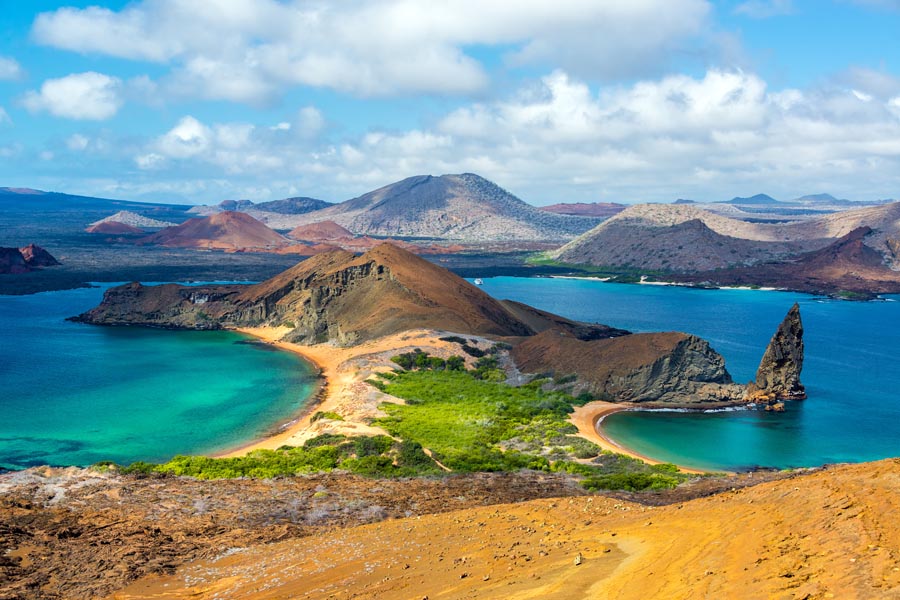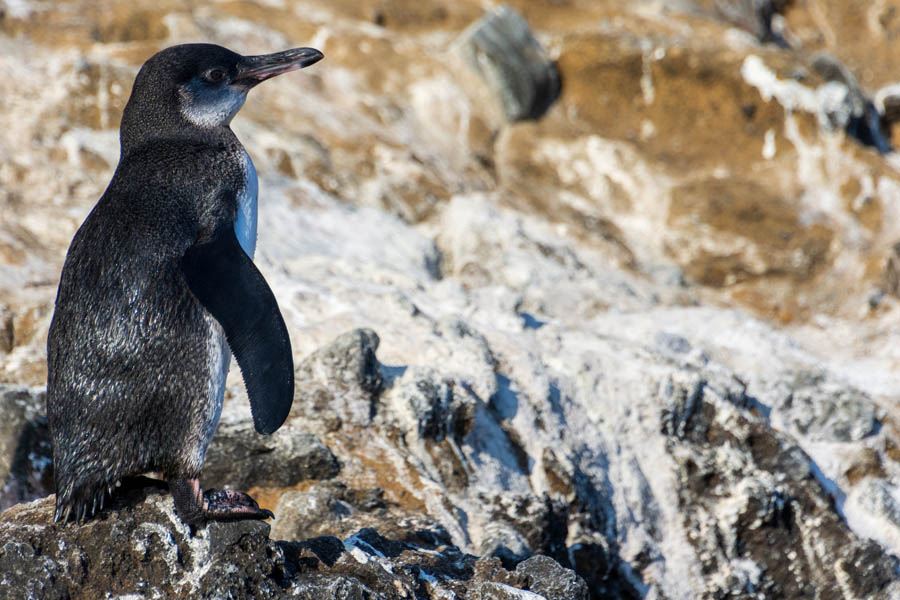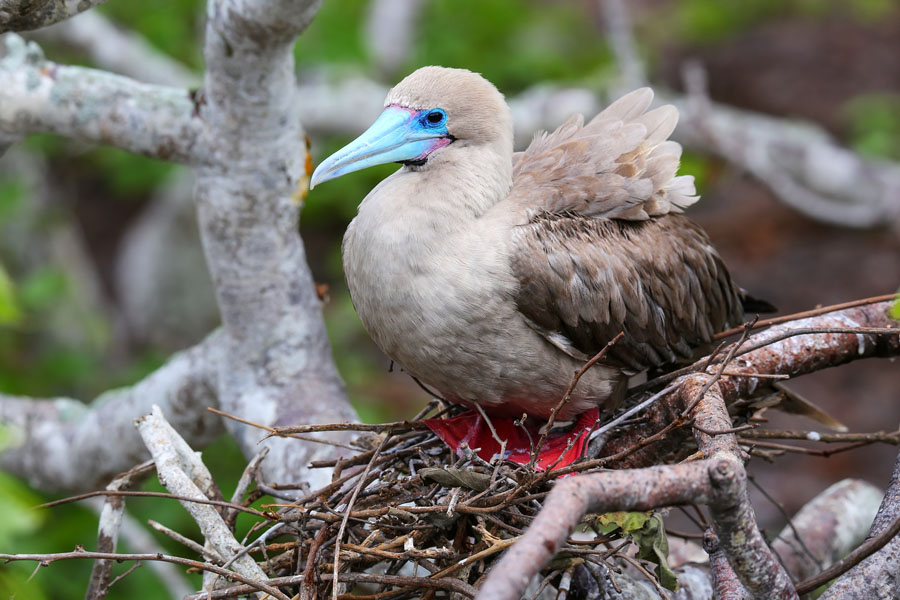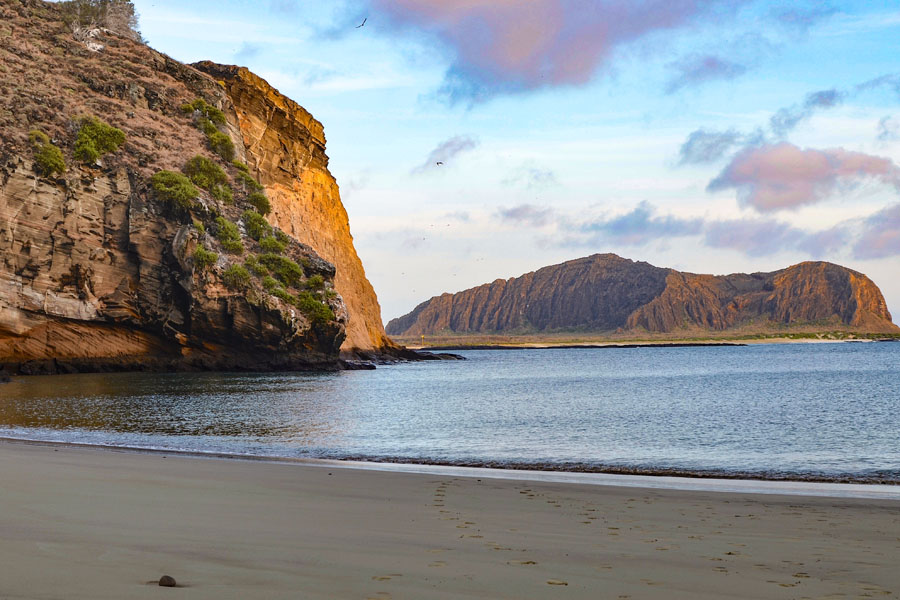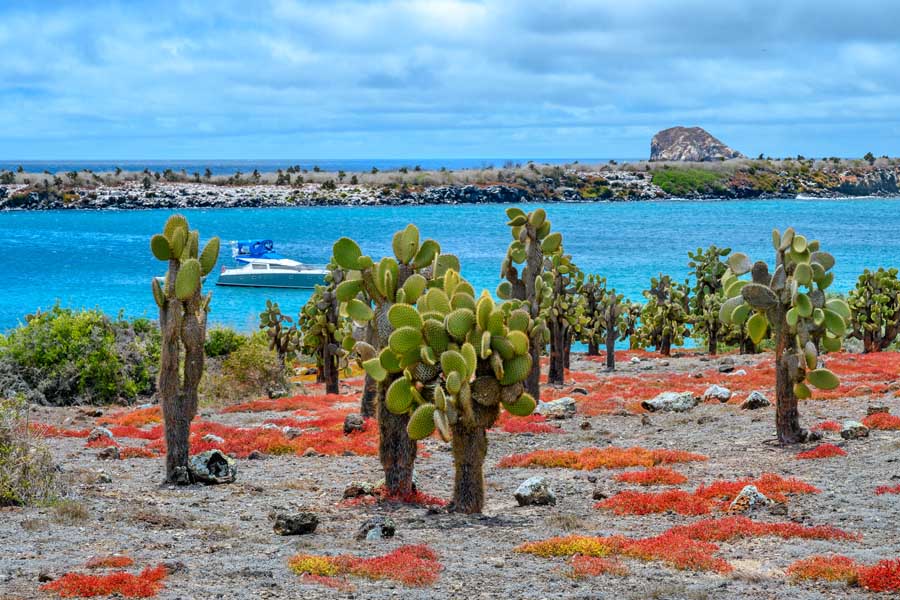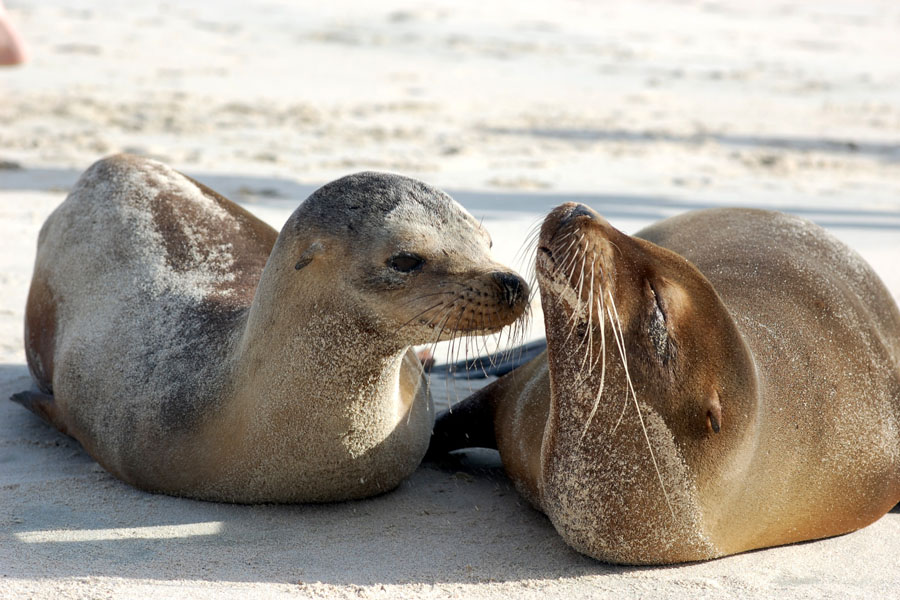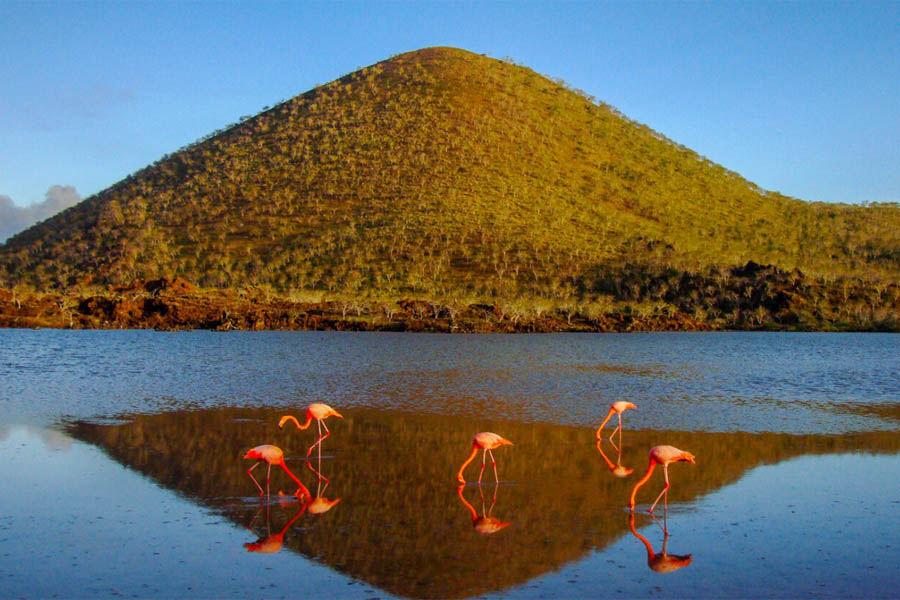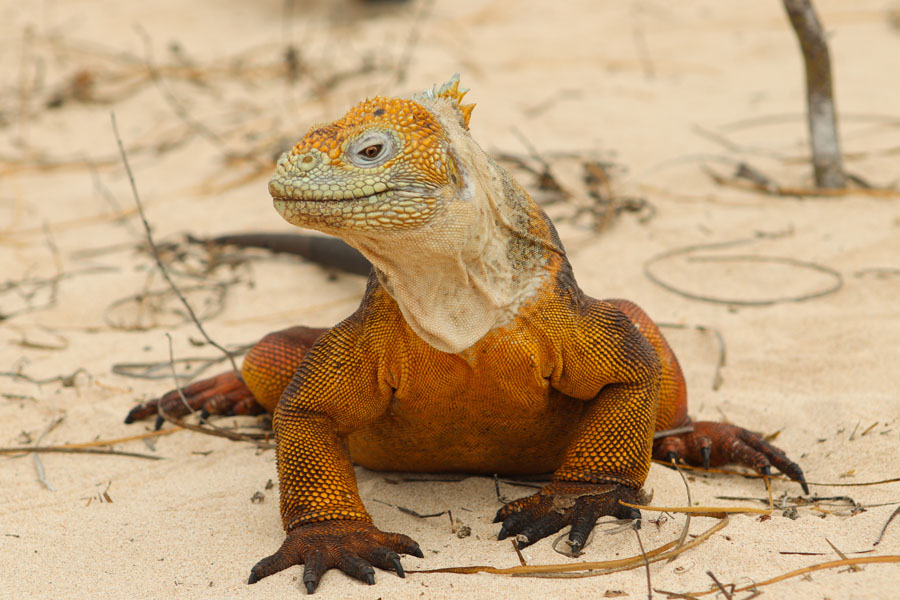Galapagos North, East & Southern Islands Cruise | Seaman Journey
9 Days
From AUD 11,162
Trip Code: ECSJ9C1
DIFFICULTY RATING: 2 (light adventure)
Start: Galapagos Islands, Ecuador
Finish: Galapagos Islands, Ecuador
SHIP: Seaman Journey
 Destination
Destination
Galapagos Islands, Ecuador
 Departure Date
Departure Date
Selected Thursdays
 Meals
Meals
All meals, water, tea & coffee while onboard your Galapagos cruise
 Transport
Transport
Group transfers in the Galapagos to & from your vessel
 Accommodation
Accommodation
Cabin on board a Catamaran Yacht
Enquire Now


 Included Sightseeing
Included Sightseeing
Daily excursions, panga rides, shore landings and expert briefings while onboard
* Itinerary is subject to change depending on weather conditions and government regulati
OVERVIEW
M/C Galapagos Seaman Journey is a first class catamaran offering superior comfort, size, style, and stability. The Galapagos Seaman Journey makes it possible to enjoy several cruises in the Galapagos with different itineraries that include amazing land tours on most of the Galapagos Islands. During these Galapagos Cruises, guests encounter many endemic species like Galapagos Giant Tortoises, Penguins, Land and Marine Iguanas, Frigate Birds, Blue Footed Boobies, and much more!
Please note that the below itinerary is a guide and that itineraries vary depending on departure date. Your sales consultant will provide you with more details on the different itinerary options available and applicable departure dates.
The Seaman Journey Experience
M/C Galapagos Seaman Journey is an expeditionary first class catamaran that began sailing the Galapagos Islands in January 2008. Superior comfort, size, style, and stability are what you can expect when choosing this catamaran to fulfill your Galapagos adventures wants and needs. This vessel, with a maximum capacity of 16 passengers, provides in each of its corners, areas for rest and recreation for everyone. For the adults who might want to relax and kick back, we offer a great bar and lounge area where they are served by our bartender whilst you relax and watch the Galapagos go by. Make landings on sites that offer beautiful scenery and the ability to get up close and personal with the archipelago, accompanied by the knowledgeable staff members found on board who will offer you intel and insight into this magnificent part of the world. The M/C Galapagos Seaman Journey, another jewel from the well known Galapagos Journey Fleet, the perfect combination of adventure, comfort, service and excellence that offers four, five, eight, eleven, twelve and fifteen day itineraries.
GREEN POINTS!
• The Seaman is single use plastic free • Reusable water-bottles are offered to all guests • Naturalist guides offer educational environmental lectures to all guests. • All guest leave with a deep love and respect for nature.
The Seaman also offers a 5 day cruise, 7 day cruise, 9 day cruise, 11 day cruise and 15 day cruises.
* Itinerary is subject to change depending on weather conditions and government regulations.
PLEASE NOTE: Pricing is subject to change and availability at the time of booking. Contact us for more information.
ITINERARY

On this day, you'll be flying to the Galapagos Islands. Please note that due to regulations set by the Galapagos Government, there is a migration control card fee of $20 USD that must be paid.
Upon arrival in Santa Cruz, passengers must undergo an airport inspection to prevent the introduction of foreign plants or animals to the archipelago. Additionally, this inspection point is where passengers are required to pay the entrance fee for the Galapagos National Park. As of August 2024, foreign passengers pay $200, while children (under 12 years old) pay $100.
Later, your guide will meet you and assist with carrying your luggage to the bus. Passengers will then be transferred to the Catamaran Seaman Journey via a motorized boat called Panga.
In the afternoon, you'll visit Bartolome Island, situated across Sullivan Bay. With an altitude of 114 meters, this island offers one of the most breathtaking landscapes in the Galapagos Islands, including volcanic cones, lunar-like craters, lava fields, and the famous Toba-formed pinnacle eroded by the sea. Vegetation on this island is scarce.
Bartolome Island features two stunning beaches where marine turtles nest, and at the base of the pinnacle, you can find a small colony of Galapagos penguins.

Today, you'll visit Mosquera Islet, situated between North Seymour and Baltra. Despite being one of the smallest islands in the Galápagos, Mosquera Islet boasts unique geological features. Formed by volcanic uplift, it lacks a visible crater and features remarkably flat terrain.
What sets Mosquera apart is its striking contrast of colors. From the beautiful white sand beach to the transparent turquoise waters, lush green vegetation, and jet-black lava rocks, the island offers a picturesque landscape perfect for photography. Don't miss capturing the stunning scenery, especially during the golden light of early morning or at sunset.
In the afternoon, your next destination is North Seymour. Unlike volcanic islands, North Seymour is a raised island with a generally flat terrain filled with rocks. It serves as an important nesting site for a large population of magnificent frigatebirds. Here, you'll also witness the captivating courtship dance of the blue-footed boobies in the open areas, while swallow-tailed gulls perch on the cliff edges.
Despite the powerful surf along the outer shore, you'll find sea lions hauling out onto the beach, sometimes even enjoying body-surfing in the waves.

This morning, your destination is Genovesa Island, specifically El Barranco, known as "The Cliff." Situated in the southern part of Darwin Bay, El Barranco offers a visitor site that consists of volcanic rock trails spanning approximately 1.5 km, typically taking around 2 hours to complete. This area represents the youngest geological formation on the island.
The cliff itself, located in the southern part, is comprised of delicate lava formations. Natural erosion within these lava flows has created optimal nesting grounds for Storm Petrels, where you can observe two species nesting in cavities and holes within the lava.
Among the inhabitants of this area, the short-eared owl stands out as one of the main predators. The red-footed booby, unique to the outer islands of the archipelago such as Punta Pitt, Gardner (Floreana), Wolf, Darwin, and Genovesa, can also be found here, along with the masked booby. During "panga rides" along the cliffs, you may spot fur sea lions and various species of seabirds.
Later today, you'll visit Darwin Bay, formed when the island's crater collapsed below sea level. A wet landing awaits you on a stunning white coral sandy beach. This island is renowned among birdwatchers for its diverse avian population, including red-footed boobies, masked boobies, wandering tattlers, lava gulls, whimbrels, yellow-crowned and black-crowned lava herons, and yellow warblers.
As you traverse the trail, ascending gradually to the cliff's edge, you'll have the opportunity to observe Red-Foots nesting in the Mangrove trees below. Birdwatchers can also spot sharp-beaked finches, large cactus and ground finches, Galapagos doves, and swallow-tailed gulls along the way. At the trail's conclusion, a breathtaking view of the island and its abundant birdlife awaits at the cliff's edge.

Today, your journey leads you to Plazas, Santa Cruz. Plazas lies to the east of Santa Cruz Island and is part of the twin islands known as Islas Plazas. Despite its modest size, Plazas hosts some of the most fascinating and remarkable species found in the Galapagos. Notably, the Plazas land iguanas here are smaller compared to their counterparts on other islands.
Throughout the island, you'll encounter several hybrid iguanas resulting from the crossbreeding of male marine iguanas and female land iguanas. These hybrids are easily identifiable by their distinctive black/gray color, featuring the crest of a land iguana and the face and tail reminiscent of a marine iguana. The thriving population of iguanas owes much to the abundance of tunas, their preferred food source. As you explore, keep an eye out for swallow-tailed gulls nesting on the rugged cliffs, as well as other seabirds like Audubon shearwaters, red-billed tropicbirds, frigatebirds, and brown pelicans.
In the afternoon, your adventure continues to Santa Fe, situated in the southeastern region of the Galapagos. Unlike most islands in the archipelago, Santa Fe's formation stems from uplift rather than volcanic activity, resulting in its predominantly flat terrain. Some theories even propose that Santa Fe could be the oldest island in the archipelago.
Santa Fe is home to a variety of endemic species, including the Galapagos hawk, Galapagos snake, Galapagos mockingbird, rice rats, and one of the two species of land iguanas found in the islands. Upon disembarking into the crystal-clear waters, you'll encounter one of the many sea lion colonies inhabiting the area. Along the trail, you'll observe numerous salt bushes and towering giant prickly pear cacti, characteristic of oceanic island gigantism. Don't miss the opportunity for snorkeling among playful sea lions and vibrant tropical fish.

This morning, your destination is the David Rodriguez Land Tortoise Breeding Centre. In 2002, the Galapagos National Park Service initiated a program for the breeding and care of tortoises in captivity, establishing the Tortoise Breeding Centre under the name Jacinto Gordillo. In 2016, it was renamed the David Rodriguez Tortoise Breeding Centre in honor of David Rodriguez's 39 years of service as a park ranger.
Located in the southeast of San Cristobal, approximately 22.5 km from Puerto Baquerizo Moreno, the David Rodriguez Tortoise Breeding Centre is accessible by land. The bus journey takes around 40 minutes and is situated near Cerro Colorado. This breeding centre aims to enhance the population of giant tortoises, Chelonoides chathamensis, on San Cristóbal Island by providing an environment similar to their natural habitat, thereby promoting tourism development on the island.
Later in the day, you'll visit the Gianni Arismendy Environmental Interpretation Centre. This center features lush gardens and breathtaking ocean views, providing visitors with insights into the geological and human history of the islands, conservation efforts, and natural history. As the oldest museum of Natural History in the Galapagos Islands, it plays a vital role in preserving the archipelago. Witnessing their research and conservation efforts firsthand is both inspiring and motivating.

Today, you'll visit Punta Pitt, situated at the eastern end of San Cristobal Island. It features a beach approximately 90 meters long and several natural viewpoints overlooking an eroded hill of volcanic tuff.
A 1,400-meter trail leads from Oliviana Beach to the top of the hill, which displays various lava formations. The strong winds on the hill have sculpted the landscape into fantastic and unforgettable scenery, resembling something out of a science fiction movie.
Oliviana Beach boasts a stunning olive-yellow color adorned with bright crystals resulting from lava and shell erosion. Here, sea lions bask in the sun while observing the flight of frigate birds, pelicans, herons, and seagulls.
Pitt Islet is one of the rare locations where you can observe all three species of boobies (blue-footed, red-footed, and masked) and both species of frigate birds in the same vicinity.
Your next destination is Isla Lobos, a small, flat islet. Named for the several sea lions that inhabit it, their brown fur stands out against the white sand as they frolic on the beach. Isla Lobos is approximately 20 minutes by boat (10 kilometers) from Puerto Baquerizo Moreno on San Cristobal Island.
Designated as a tourist diving site, Isla Lobos offers two piers from which tourists can explore the ocean floor accompanied by sea lions. The protected channel in its waters provides an excellent spot for snorkeling. An 850-meter trail runs along the island, connecting the two piers. The estimated walk time is one hour, during which you can observe coastal vegetation consisting of saltwater-tolerant plants. The island is named after the two species of sea lions that inhabit it, one related to the California sea lions and the other, the fur seals, originating from Antarctica.

Today, you will explore Española Island, specifically Gardner Bay. Situated on the northeastern coast of Hood Island, Gardner Bay boasts a fantastic beach perfect for relaxation, swimming, and kayaking. It's also an ideal spot for observing sea lions (Zalophus wollebaki), and if you're lucky, you may even catch sight of sharks in the crystal-clear ocean waters.
At this location, you can observe three species of Darwin finches: a subspecies of the large-billed cactus finch (Geospiza fuliginosa), resembling the large-billed terrestrial finch; the small-beaked ground finch (Geospiza fuliginosa); and the singing finch (Certhidea Olivacea), another endemic subspecies. Both resident and migratory birds can be spotted in this area.
Later in the day, you'll head to Suarez Point. This area is excellent for spotting blue-footed boobies, albatrosses, and Nazca boobies. Situated on the oceanfront, it is a beautiful site where the large waved albatrosses use the cliff as a launching pad. The famous attraction here is the magnificent blowhole, which spurts water high into the air, reaching heights of at least 50 to 75 meters. This site offers wonderful photography opportunities.

This morning, you'll head to Cormorant Point on Champion Islet. This site boasts perhaps the best flamingo lagoon in the Galapagos, one of the largest in the islands. Situated between two tuff lava cones, the area exudes a special atmosphere. Besides flamingos, you'll have the chance to observe various species of shorebirds, including common stilts, white-cheeked pintail ducks, and other migratory birds. Two distinct beaches await exploration: "The Green Beach," named for its high percentage of olivine crystals in the sand, and the "Flour Sand Beach," composed of coral.
After an intriguing walk, the group will be taken to Champion Islet, an excellent spot for snorkeling and experiencing underwater wildlife. Keep an eye out for sea turtles, sea lions, and a plethora of fish thanks to the nearby coral reef.
Later in the day, you'll visit Post Office Bay. Historically, this site housed a wooden barrel placed in the 18th century by the crew of a whaling ship. Used as a post office by mariners and tourists ever since, the tradition involves carrying letters or postcards to their destinations by hand. Additionally, this area served as the landing site for some of the first colonists. This afternoon is dedicated to relaxation, allowing visitors to unwind on the beach and soak in the beauty of the Galapagos.

In the morning, you'll explore the Fausto Llerena Breeding Centre. Situated within the Galapagos National Park, it's located on Charles Darwin Avenue, approximately 1 km from the Gus Angermeyer Tourist Pier. Accessible after a scenic 40-minute walk, this attraction is an integral part of the Charles Darwin Foundation's network of visitor sites.
The visit commences at the information booth of the Galapagos National Park Service (SPNG). Following the trail, you'll first arrive at the Van Straelen Interpretation Centre before reaching the breeding centre itself. From there, an elevated circular wooden path provides excellent vantage points for observing Lonesome George and the tortoises from Española Island. The path concludes at the tortoise exhibition corral.
After the visit, you'll be transported to the Baltra airport in time for your flight back to the mainland.

Seaman Journey
M/C Galapagos Seaman Journey is an expeditionary first class catamaran that began sailing the Galapagos Islands in January 2008. She is an expeditionary catamaran offering superior comfort, size, style, and stability. This vessel, with a maximum capacity of 16 passengers, provides in each of its corners, areas for rest and recreation for everyone. For the adults who might want to relax and kick back, we offer a great bar and lounge area where they are served by our bartender who will be happy to attend to all their needs and desires whilst you relax. The M/C Galapagos Seaman Journey, another jewel from the well known Galapagos Journey Fleet, the perfect combination of adventure, comfort, service and excellence! Please note that on board spending money is cash only.
Ice Class:
Length: 90 feet (27.6 meters)
Breadth: 36.08 feet (11 meters)Max
Draft: Cruising
Speed:
Electricity: 110v and 220v AC/DC Passenger
Capacity:16
View Ship Details
Accommodation
We believe that appropriate accommodation should add to the authentic travel experience, as well as providing utmost enjoyment. For that reason our accommodation is scrutinised by our staff on the ground frequently, ensuring the properties adhere to our high standards. This key will help you understand the levels of accommodation available on this tour.
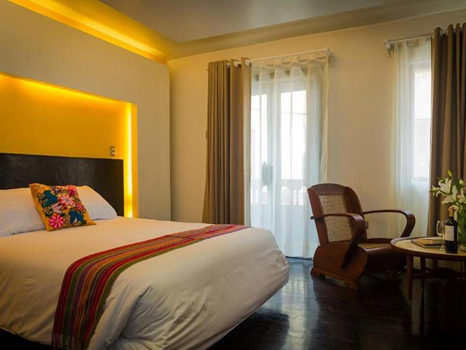
Standard
Comfortable properties with dependable facilities and service.

Superior
Comfortable properties with dependable facilities and service.
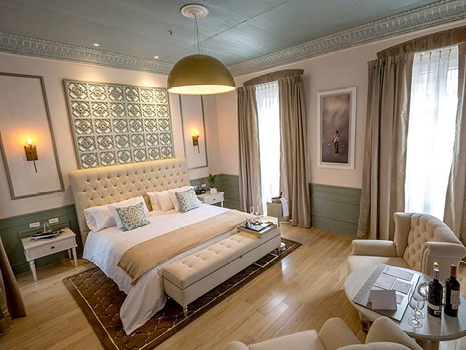
Deluxe
Luxurious properties with impeccable facilities and service.
Pricing per person & date
| Galapagos North, East & Southern Islands Cruise | Seaman Journey from AUD 11,162 | ||
| Selected Thursdays | ||
EXTEND YOUR TRIP
Important Information
All entrance fees are subject to change without prior notice.
Please note kayak activities are subject to weather conditions.
Prices are based on per person, twin share* (unless otherwise stated)
Prices are correct at time of publishing but are subject to change at any time
* Itinerary is subject to change depending on weather conditions and government regulations.
INCLUSIONS
Accommodation
All meals
Water coffee and tea
All excursions
English-Speaking Naturalist guide
Snorkelling equipment
Kayak equipmentEXCLUSIONS
Return airfares from mainland Ecuador
Galapagos National Park Entrance Fee (US$200 per person from Aug 2024 - Subject to change)
Galapagos Transit Control Card (US$20 per person - Subject to change)
Wet suit rental
Soft drink & alcoholic drinks
Personal expenses
Gratuities for crew/guides
- 2 (light adventure)
A single supplement surcharge applies and is subject to availability. Please contact us for more information.
Seasonality, fuel surcharges, currency fluctuations and availability at time of booking.
